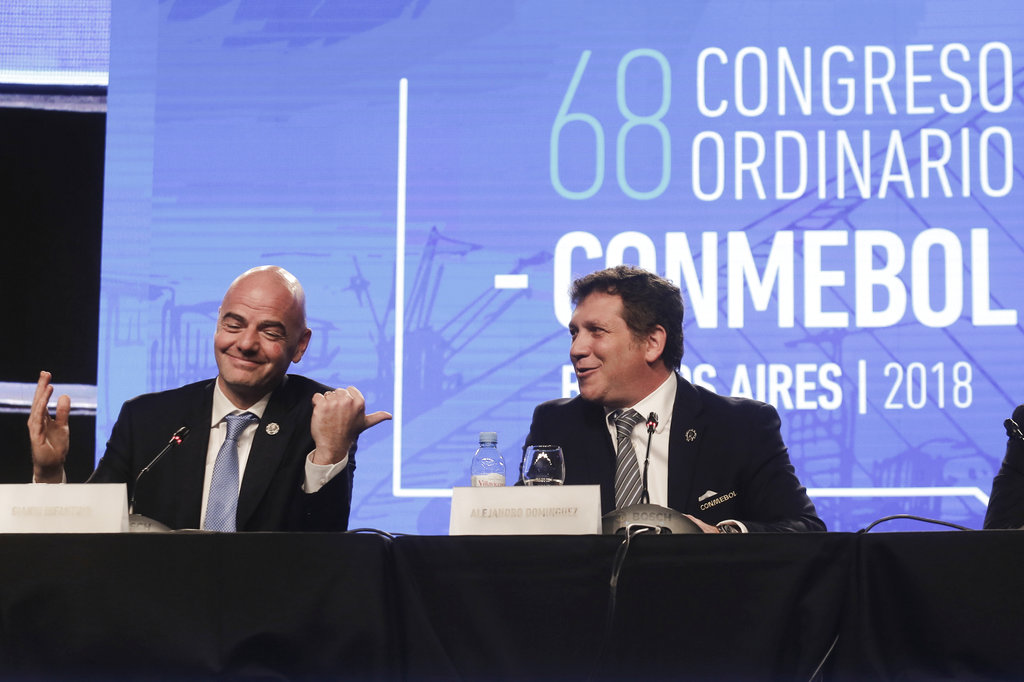
FIFA President Gianni Infantino, left, talks with Alejandro Dominguez, right, president of the South American Football Confederation, CONMEBOL, during their annual conference in Buenos Aires, Argentina, Thursday, April 12, 2018. CONMEBOL has asked FIFA to expand the World Cup to 48 teams for the 2022 tournament in Qatar. (AP Photo/Martin Ruggiero)
GENEVA — Top European leagues are set to oppose FIFA plans for adding more teams and playing days at the 2022 World Cup.
FIFA President Gianni Infantino wants to study a 48-team tournament plan that would add 16 teams, 16 extra games and at least four days to the scheduled 28-day event kicking off in November 2022 in Qatar.
That schedule would likely take another round of weekend fixtures from the English Premier League, Spain’s La Liga and others which already must shut down in mid-season.
“We are not prepared to make any changes on the calendar for expanding the 2022 World Cup.” Lars-Christer Olsson, CEO of the 32-member European Leagues group, said on Monday.
“We have already been flexible to allow the World Cup to be played in the (Qatari) winter and have agreed the dates,” Olsson said, adding “we are not prepared for the duration of the World Cup to be any longer.”
Infantino’s support last week for a 48-team World Cup ahead of the agreed expansion for the 2026 edition comes more than seven years after Qatar won hosting rights from FIFA’s then-executive committee.
Qatar bid to stage a 32-team, 64-game tournament in June-July 2022 despite the searing desert heat, with a pledge to develop stadium cooling technology.
In 2013, FIFA started consulting soccer officials worldwide in an 18-month process that reached an expected conclusion — to push back the schedule and play in cooler months, with a Nov. 21-Dec. 18 schedule.
That shorter, 28-day program — instead of the typical 32-day tournament — was a concession to Europe where most World Cup players are employed, and leagues wanted the shortest possible forced shutdown.
FIFA’s calendar for national-team games, which mandates when clubs must release players, has a Monday, Nov. 14, 2022 call-up date for World Cup teams.
An extra four days on the 2022 World Cup program would likely mean moving up the World Cup program, and taking the Nov. 12-13 fixture dates away from European leagues.
“FIFA seems to be on an expansion drive,” said Olsson, who this year joined UEFA’s executive committee to represent the leagues. “It’s time people thought about the players — they need time to rest. It cannot just be money deciding how football should be organized.”
European clubs were the most vocal opponents of a November-December tournament before FIFA agreed on the switch to winter three years ago.
Soon after the accord, FIFA and the European Club Association representing more than 200 members signed a new working deal which guaranteed clubs worldwide a $209 million share of World Cup revenues from each of the 2018 tournament in Russia and the 2022 edition in Qatar.
The money is distributed on a daily rate for players involved in the tournament to each club which employed him during the two previous years.
The ECA declined to comment last week when the 2022 World Cup expansion idea was announced on Thursday in Buenos Aires, Argentina, at a meeting of South American soccer body CONMEBOL which was attended by Infantino.
FIFA does not pay a share of World Cup revenues to the European Leagues group.
The 2022 expansion plan could require Qatar to share hosting duties with some regional neighbors.
The gas-rich emirate is completing eight stadiums for a 64-game tournament, though FIFA’s ideal design for a 48-team, 80-game tournament calls for 12 venues.
Infantino’s suggested feasibility study to look at 2022 tournament expansion could be agreed on at scheduled meetings in Moscow ahead of the World Cup kicking off on June 14.